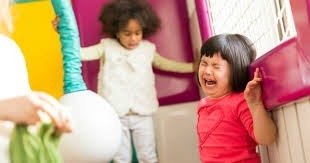
Tips To Help Stop Your Child From Hitting Other Children
26 Jun 2018 | 4 min Read
Babychakra
Author | 1369 Articles
So, you arrive to pick up your kid after school only to hear complaints about your child hitting other kids. It can be distressful and heart-breaking for any parent, especially if there have been similar incidents in the past too. While you don’t have to worry about this being a manifestation of poor parenting or your child suffering from psychological issues, it is not a phase a child will grow out of on their own. If left uncorrected, hitting other children can become a long-term habit.
Here are some tips to stop the tendency of your child hitting others:
Look for Patterns
Every time an incident of your toddler hitting other kids happens in front of you, look for any patterns that trigger such behaviour. In most cases, kids resort to hitting as a substitute for their inability to express or process certain emotions. In that sense, your child hitting others in nursery is an extension of tantrums. Once you’ve identified the pattern or triggers, use them as a base to plan and implement corrective measures and not as an excuse to allow your child’s behaviour.

Stay Close to Your Child
If you sense that another episode of your child lashing out is building up, move and stay as close to your child as possible. This gives them more confidence in their ability to handle an unpleasant situation and they can be rest assured that you are there to back them up should things go out of hand.

Do Not Hit Your Child
No matter how enraging, frustrating, or disappointing your child’s behaviour feels at the moment, do not hit your child to ‘give them a taste of their own medicine’. For one, by resorting to hitting your child you are validating physical aggression as an acceptable reaction to uncomfortable situations. Secondly, it’ll further aggravate whatever hard-to-process emotions are triggering incidents of your toddler hitting other kids.

Respond Calmly
No matter how enraging, frustrating, or disappointing your child’s behaviour feels at the moment, do not hit your child to ‘give them a taste of their own medicine’. For one, by resorting to hitting your child you are validating physical aggression as an acceptable reaction to uncomfortable situations. Secondly, it’ll further aggravate whatever hard-to-process emotions are triggering incidents of your toddler hitting other kids.

Respond Calmly
Before you approach your upset child, take a moment to calm yourself down. Take a few deep breaths and blow out the tension. It is only natural for you to feel unsettled or anxious over such behaviour but you must deal with your own emotions before you talk to your child. Children can pick up on negative emotions and it can worsen their already overwhelmed state of mind.

Respond Immediately
You must not wait until you get back home to deal with the inappropriate behaviour of your child hitting in nursery. By then your little one is already too far removed from the situation and it is hard for them to co-relate your reaction as a consequence of their behaviour. Get down to your child’s level, and tell them ‘no hitting’ in a soft but firm voice. Ask your child to apologise to the other kid, and if necessary, join them in offering an apology, and then, remove them from the scene for a time-out.

Keep Extra Vigil on Your Child
Until you have resolved you child’s tendency to lash out at other kids, keep an extra eye on them to prevent such situations. You can ask the teacher or caretakers at the school to do the same to avoid incidents of hitting and aggression.
Banner Image: mamamia
A


Related Topics for you
Suggestions offered by doctors on BabyChakra are of advisory nature i.e., for educational and informational purposes only. Content posted on, created for, or compiled by BabyChakra is not intended or designed to replace your doctor's independent judgment about any symptom, condition, or the appropriateness or risks of a procedure or treatment for a given person.
